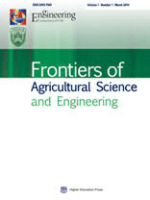
Frontiers of Agricultural Science and Engineering
Scope & Guideline
Transforming veterinary studies through collaborative research.
Introduction
Aims and Scopes
- Sustainable Agricultural Practices:
The journal explores innovative agricultural methods that reduce environmental impact while enhancing productivity, such as organic farming, integrated pest management, and agroecological approaches. - Environmental Sustainability:
Research in this area focuses on the interactions between agricultural practices and environmental health, including soil conservation, water management, and biodiversity preservation. - Food Security and Nutrition:
The journal addresses challenges related to food production and distribution, aiming to enhance food security through research on sustainable food systems and nutritional strategies. - Carbon Neutrality and Climate Change Mitigation:
Papers often discuss pathways to achieving carbon neutrality in agriculture, including carbon sequestration techniques and strategies to reduce greenhouse gas emissions. - Technological Innovations in Agriculture:
The journal highlights advancements in agricultural technology, including precision agriculture, biotechnology, and the use of artificial intelligence to improve farming practices. - Policy and Socioeconomic Aspects of Agriculture:
Research often includes the examination of agricultural policies, economic implications of sustainable practices, and social impacts on farming communities.
Trending and Emerging
- Agricultural Green Development:
A surge in research on agricultural green development highlights the need for environmentally sustainable practices that also enhance productivity and food security, particularly in China. - Carbon Sequestration and Climate Resilience:
Emerging studies emphasize strategies for carbon sequestration in agricultural systems as a means to combat climate change, reflecting an increased focus on carbon management. - Innovations in Nutrient Management:
There is a growing interest in optimizing nutrient management practices, particularly nitrogen management, to enhance sustainability and reduce environmental impacts. - Integration of Technology in Agriculture:
The adoption of advanced technologies such as artificial intelligence, remote sensing, and data analytics in agriculture is increasingly being explored to improve efficiency and sustainability. - Water Resource Management:
As water scarcity becomes a pressing issue, research is trending towards innovative water management practices in agriculture to ensure sustainable water use and quality. - Sustainable Food Systems and Nutrition Security:
Emerging themes focus on transforming food systems to enhance nutrition security and resilience, aligning agricultural practices with public health goals.
Declining or Waning
- Traditional Fertilization Techniques:
Research on conventional fertilization methods is decreasing as emphasis shifts towards sustainable alternatives, such as organic fertilizers and integrated nutrient management. - Single-Crop Systems:
There is a noticeable reduction in studies focusing solely on single-crop systems, as the trend moves towards intercropping and diversified cropping systems that enhance resilience and sustainability. - Conventional Pest Control Methods:
The focus on traditional chemical pest control strategies is waning in favor of integrated pest management (IPM) and biopesticides, reflecting a broader shift towards environmentally friendly practices. - Historical Agricultural Practices:
Research detailing historical agricultural practices is becoming less common, as contemporary studies prioritize innovative and future-oriented approaches to agriculture. - General Soil Health Studies:
While soil health remains a critical topic, there is a decline in studies that do not incorporate specific sustainable management practices, as the journal increasingly emphasizes actionable solutions.
Similar Journals

PHILIPPINE AGRICULTURAL SCIENTIST
Nurturing Ideas, Growing Agricultural Excellence.PHILIPPINE AGRICULTURAL SCIENTIST is a pioneering journal published by the University of the Philippines Los Baños, dedicated to advancing the fields of Agronomy, Crop Science, Animal Science, and Biotechnology. With an ISSN of 0031-7454, this esteemed journal provides a vital platform for researchers and practitioners focusing on agricultural innovations and practices in the Philippines and beyond. With a robust history dating back to 1996 and continuing through 2024, the journal operates within the Q4 quartile, reflecting its potential for growth and impactful contributions in its categories. Despite currently being positioned in the lower ranks, it serves as an essential publishing venue for nascent studies and localized research, contributing to the agricultural discourse. The journal fosters a collaborative research environment, encouraging submissions from both emerging scholars and seasoned experts, making it a valuable resource for students, professionals, and researchers engaged in the agricultural sciences. While it currently does not offer open access, it plays a crucial role in disseminating vital knowledge aimed at enhancing agricultural practices in the region.

AGRONOMIA MESOAMERICANA
Fostering collaboration in the heart of Mesoamerica's agriculture.AGRONOMIA MESOAMERICANA is a distinguished open-access journal published by UNIV COSTA RICA, dedicated to advancing knowledge in the fields of agronomy, crop science, food science, and soil science. Since its inception in 1990, the journal has provided a platform for researchers and professionals to disseminate their findings, contributing significantly to the agricultural sciences. With an E-ISSN of 2215-3608, it operates from Costa Rica, specifically from the Centro Investigaciones Agronómicas, situated in San José. Despite its current classification in the Q4 quartile for 2023 in the respective fields, it aims to stimulate academic discourse and inspire innovative solutions to pressing agricultural challenges. The journal attracts a diverse audience and encourages submissions that focus on sustainable practices, food security, and environmental stewardship, making it an essential resource for researchers, professionals, and students alike seeking to enrich their understanding and share crucial insights in the agronomy landscape. Open access ensures that all published research is freely available, fostering collaboration and knowledge exchange worldwide.
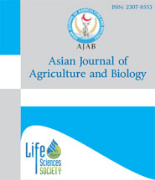
Asian Journal of Agriculture and Biology
Transforming research into practice for sustainable agriculture and health.Welcome to the Asian Journal of Agriculture and Biology, a premier open access journal published by LIFE SCIENCES SOC PAKISTAN, dedicated to advancing research in the fields of agricultural and biological sciences. Since its inception in 2013, this journal has provided a vital platform for scholars and practitioners to disseminate novel findings and innovative methodologies that contribute to the betterment of agricultural practices and biological research. With an impressive H-Index and ranked in the Q3 category across multiple disciplines including Agricultural and Biological Sciences, Biochemistry, Genetics, and Molecular Biology, as well as Medicine, the journal showcases high-quality research that influences both academic and practical applications globally. The journal is indexed in Scopus, reinforcing its commitment to high academic standards and providing researchers with efficient access to significant knowledge. Based in Pakistan, the Asian Journal of Agriculture and Biology is your gateway to staying abreast of the latest trends and discoveries that support sustainable development and health sciences.
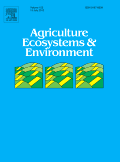
AGRICULTURE ECOSYSTEMS & ENVIRONMENT
Uncovering the Synergy Between Agriculture and the EnvironmentAGRICULTURE ECOSYSTEMS & ENVIRONMENT is a premier journal published by Elsevier, specializing in the fields of agronomy, animal science, and ecology. With an impressive impact factor reflective of its stature, it ranks in the top quartile (Q1) across three significant categories, highlighting its critical role in advancing research within the agricultural and environmental sciences. The journal serves as a vital platform for disseminating high-quality research that addresses the complex interactions between agriculture and ecosystems, providing insightful methodologies and findings that inform sustainable practices. As the journal continues to converge from 1983 and through to 2025, it remains committed to offering both traditional and innovative access options while contributing to the academic community's understanding of pressing environmental challenges. Researchers, professionals, and students are encouraged to engage with the journal's comprehensive content, which is positioned among the elite in its fields, having achieved top rankings in Scopus across relevant disciplines.

SPANISH JOURNAL OF AGRICULTURAL RESEARCH
Connecting Research and Practice in AgricultureThe Spanish Journal of Agricultural Research (ISSN: 1695-971X, E-ISSN: 2171-9292), published by the prestigious Consejo Superior Investigaciones Cientificas (CSIC), serves as a vital resource for those engaged in the fields of agronomy and crop science. Established as an Open Access journal since 2003, it aims to foster the dissemination of innovative research and practical applications related to agricultural practices and sustainability. With its Q3 category in Agronomy and Crop Science and a Scopus ranking of #224 out of 406, the journal provides an accessible platform for scholars to share valuable findings that enhance agricultural productivity and environmental stewardship. Covering research from 2006 to 2024, this journal continues to be instrumental for researchers, professionals, and students eager to remain at the forefront of agricultural science advancements.
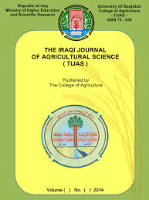
Iraqi Journal of Agricultural Sciences
Nurturing insights that shape the future of farming.The Iraqi Journal of Agricultural Sciences, published by the College of Agricultural Engineering Sciences, University of Baghdad, is a prominent open-access journal that has been disseminating valuable research in the fields of agricultural and biological sciences since 2005. With an ISSN of 0075-0530 and an E-ISSN of 2410-0862, this journal serves as an essential platform for scholars to share their findings and advancements in various disciplines, including animal science, horticulture, and food science. Recognized for its excellence, the journal achieved Q1 ranking in multiple categories, reflecting its significant contribution to the scientific community and its impact within Scopus rankings. It is particularly dedicated to fostering research that addresses local and global agricultural challenges and promotes sustainable practices in Iraq and beyond. As a pivotal resource for researchers, professionals, and students alike, the Iraqi Journal of Agricultural Sciences invites submissions that advance our understanding of agricultural sciences while supporting the open dissemination of knowledge in this vital sector.
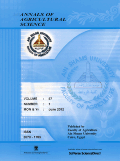
ANNALS OF AGRICULTURAL SCIENCES
Exploring Innovations that Cultivate Tomorrow's SolutionsANNALS OF AGRICULTURAL SCIENCES, published by Elsevier, stands as a leading open access journal dedicated to the multifaceted field of agricultural sciences. Since its inception in 2011, this journal has served as a pivotal platform for the dissemination of high-quality research, covering areas such as agronomy, animal science, horticulture, food science, plant science, and soil science. With an impressive Q1 ranking across multiple disciplines and notable positions in Scopus Ranks—including #6 in Animal Science and Zoology and #3 in Horticulture—this journal is recognized globally for its significant contribution to advancing agricultural innovations. The journal caters to a diverse audience of researchers, professionals, and students, providing them with open access to cutting-edge studies that address critical issues in agricultural productivity and sustainability. Its commitment to high-impact research ensures that articles contribute meaningfully to the scientific community, fostering advancements in agricultural practices and policies.

China Agricultural Economic Review
Elevating Academic Discourse in Agricultural SciencesChina Agricultural Economic Review, published by EMERALD GROUP PUBLISHING LTD, is a premier journal that holds a significant position in the fields of agricultural economics and biological sciences. With its ISSN 1756-137X and E-ISSN 1756-1388, this journal has dedicated itself to advancing academic discourse since its inception in 2008 and continues through 2024. It boasts an impressive Q1 ranking in both Agricultural and Biological Sciences and in Economics and Econometrics, reflecting its high-quality research contributions, as evidenced by its standing in the top percentiles of Scopus rankings (97th and 92nd, respectively). Aimed at fostering scholarly exchange among researchers, professionals, and students, the journal invites original research articles, reviews, and case studies that explore vital issues and developments impacting agricultural economies, with a keen focus on both theoretical and practical advancements. As a well-regarded platform within the United Kingdom, the journal promotes accessibility and encourages significant contributions to enhance the understanding of agricultural economic dynamics worldwide.

Agriculture-Basel
Connecting Researchers with the Future of AgricultureAgriculture-Basel is a prestigious, peer-reviewed journal published by MDPI, specializing in the dynamic fields of agronomy, crop science, food science, and plant science. Established in 2011, this open-access journal serves as a pivotal platform for disseminating innovative research and developments in agricultural practices and technologies. With its impressive impact factor and ranking within the top quartiles in key categories, including Q1 in Agronomy and Crop Science and Q2 in Food Science and Plant Science, the journal has garnered significant attention from the research community. Its current Scopus rankings reflect its influence and importance, with notable positions in agricultural and biological sciences. Aimed at researchers, professionals, and students in the agricultural sector, Agriculture-Basel is committed to fostering a deeper understanding of sustainable practices and advancements in the field. With an emphasis on accessibility, the journal ensures that its valuable content is freely available since its inception, making it a cornerstone resource for all those engaged in contemporary agricultural research and applications.

Journal of Agricultural Sciences-Tarim Bilimleri Dergisi
Fostering Dialogue for a Sustainable Agricultural FutureJournal of Agricultural Sciences - Tarim Bilimleri Dergisi, published by Ankara University, Faculty of Agriculture, is a prominent open-access journal that has been fostering academic dialogue in the field of agricultural studies since 2010. With ISSN 1300-7580 and E-ISSN 2148-9297, this journal contributes significantly to the scientific community, particularly within the realms of agronomy, crop science, animal science, and plant science. As of 2023, it holds a Q3 classification in Agronomy and Crop Science, and Q4 in both Animal Science and Zoology and Plant Science, indicating its growing influence and dedication to advancing research in these areas. Situated in Turkey, this journal serves as a vital platform for scholars, professionals, and students, inviting submissions that enhance our understanding of agricultural innovation and sustainability. With a commitment to disseminating high-quality research, Journal of Agricultural Sciences ranks favorably within Scopus, providing an invaluable resource for exploring evolving agricultural paradigms.